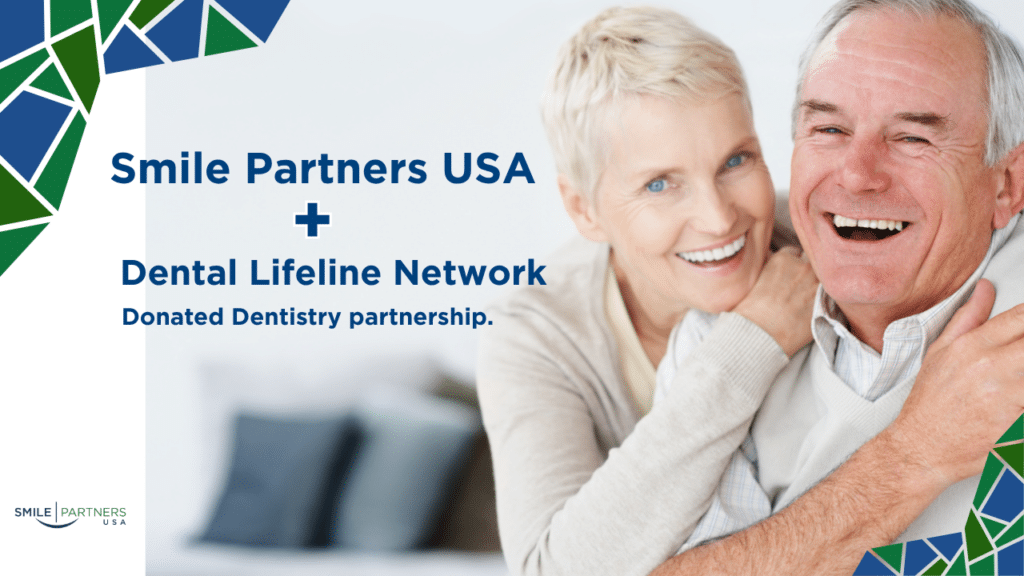
Every year, far too many Americans forego essential dental care because they cannot afford to see a dentist. A lack of dental care is prevalent for lower income and uninsured individuals. For all people, but in particular for people over the age of 65,1 dental health and overall wellness are directly linked which makes this lack of accessibility incredibly impactful and dangerous. Smile Partners USA (SPUSA) is comprised of practices spread across five states with a common goal: to create happy, healthy smiles for as many people as possible in the communities we serve. This includes, of course, the most vulnerable populations and those who do not have access to the resources necessary for consistent care. Everyone deserves a happy, healthy smile. Dental Lifeline Network (DLN) is an organization committed to changing access to dental care for people who have exhausted all options for accessing care through public aid or assistance. Smile Partners USA, a network of dental practices in Alabama, Colorado, Georgia, Illinois, and Michigan, is teaming up with Dental Lifeline Network. Together we aim to change access to dental care for patients over the age of 65 who are disabled and without traditional access to dental health services in as many communities as possible—one appointment at a time.
Currently, there are more than 12,000 dentists who volunteer with Dental Lifeline Network, and there are thousands of patients who are on the list, approved by DLN and waiting on life changing dental care. While Medicare provides care to those who need it most in many situations, it’s an unfortunate truth that Medicare doesn’t bridge every gap and lapses in care are a common occurrence, particularly dental care. According to the National Library of Medicine:
About one half of seniors do not go to the dentist. More than one in five Medicare beneficiaries have not visited a dentist in five years. Cost is the major reason why seniors do not seek or utilize dental care. Approximately 70% of older Americans lack dental insurance.2
Many of these seniors live on a fixed income, and dental care expenses can overwhelm these individuals who have almost zero wiggle room in their budgets. Unfortunately, there is also a belief permeating American culture that proper dental care is reserved only for the wealthy. In fact, “oral health has been seen as a status symbol in this country. Having a healthy smile is considered a luxury, not a necessity” according to Brenda Heaton, PHD, MPH whose research at the University of Utah also discusses the connection between dental and overall health, something we are passionate about at SPUSA.3 So, when there is a belief among those who struggle to pay for even their basic needs, that dental care is for people with different financial situations than their own, it makes sense that oral health declines within these groups of people. Smile Partners USA and Dental Lifeline Network won’t accept this as ok and won’t stop working to change it.
Individual offices within the Smile Partners USA network are committing to providing what DLN calls Donated Dental Services (DDS) to aid those who desperately need dental care services but cannot afford treatment nor access public funding or aid. Founded in 1985, Dental Lifeline Network has helped more than 170,000 people over the years. For many Americans, although they are elderly and disabled, aid is unable to cover necessary treatments. This fact is troubling, and DLN partners with dentists nationwide who are willing to donate their time and expertise to do something about it. Potential patients can check their eligibility by visiting the Dental Lifeline Network website to apply which will result in a phone call from DLN to review the application and next steps. Once approved, a dental office partnered with DLN can help the patient with the dental care needed. Cosmetic dental care is not included in this program, and some more complex cases may be beyond the scope of possibility. However, for many patients, neglected basic dental care can turn into a more serious problem with the potential to impact overall health and wellness if left untreated for longer periods of time.
If you are in the position to help, we encourage you to jump in and join the fight. If you’re a dental professional who believes your office might be interested in helping Dental Lifeline Network, you can learn more on their website. If you’re an individual, perhaps a patient at a Smile Partners USA practice, there are opportunities to give via the DLN website as well if you feel so inclined. Monetary donations are not the only way to help, however. Check on the older people in your life who may not have the resources or access to care necessary for prime oral health to be maintained. Let them know about the Dental Lifeline Network and share with your network the information you’ve learned about the lack of oral healthcare for vulnerable seniors. Together, even through simple conversations, we can make a difference!
Sources:
1National Center for Health Statistics (2024, April). Dental Care Among Adults Age 65 and Older: United States, 2022 Retrieved from: https://www.cdc.gov/nchs/products/databriefs/db500.htm
2National Library of Medicine (2017, June). Oral Health and Aging Retrieved from: https://pmc.ncbi.nlm.nih.gov/articles/PMC5497890/
3 Brenda Heaton, PHD, MPH The University of Utah (2023, Nov 7). Oral health is a right, not a privilege Retrieved from: https://attheu.utah.edu/facultystaff/oral-health-is-a-right-not-a-privilege/
